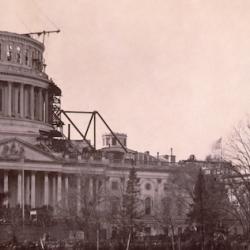When Ewa Thompson joined the Indiana University faculty in 1968 as an assistant Professor of Slavic Languages and Comparative Literature, Vietnam War protests were at their peak. A native of Poland, Thompson could not understand why Americans didn’t unite against the Communists in Vietnam. Her first-hand experience with Communism, and her dismay at the intellectual life of the American universities, made her a conservative.
As she describes it, “The brainwashing performed by Soviet sympathizers on American campuses was universal in those days, and only persons on the Right dared to say that the pro-Soviet indulgence was based on wishful thinking rather than fact. The liberals were like sleepwalkers in a fog. How did it happen that in a free country like the United States the entire academic community had fallen under the spell of the discreet charm of the Gulagoisie? Mild criticism of the Soviet Union was pervasive, but my fellow professors of Russian history and literature treated Soviet culture and politics as if it were genuine, and not a cover for one of the worst periods of barbarism in history. How was it possible that they did not wish to understand that communist practice was grounded in a deep contempt for humankind? Even in a free country it is apparently possible to fool most of the people most of the time.”
This “indifference” toward Soviet brutality led her to take a deeper look at the ideas that that were at the base of American liberalism: “I noted that they generally praised the French Revolution, just as it had been in the school textbooks I endured in Soviet-occupied Poland. I noted that in the American academic establishment, just as in Soviet-occupied Poland, the Spanish Civil War was described in black and white terms, Franco being all black and the republicans all white. I noted that the rise of communism in Hungary and Germany after the First World War was gently smoothed away in books, as if the German or Hungarian communists were the good guys opposing the all-bad “fascist” establishments. I noted that the Polish-Soviet war of 1920, in which the newly reconstituted Poland miraculously defeated the Soviet Union (somewhat like Finland in 1940), thus stopping the march of communism westward, was erased from America’s historical memory. I noted that the lighthearted commentary on the Soviet Union supplied by American Sovietologists (Richard Pipes being a rare exception) falsified the relationship between Soviet Russia and the subjugated nations of Central and Eastern Europe. I noted that no one on the Left really cared that, were it not for Stalin’s friendship with Hitler expressed in the Molotov-Ribbentrop Pact of 23 August 1939, there would have been no Second World War. In those days no respectable publisher would accept U.S. Ambassador Arthur Bliss Lane’s book I Saw Poland Betrayed. I also noted that in order to advance in American academia, one had to accept a great deal of the idées reçues that I knew were wrong, and profess disinterest in any kind of historical inquiry that did not correspond to an agenda friendly to the Left. In these circumstances, the additional factor of ‘the amazing power of money’ (to borrow from Great Expectations) made brilliant writers side with the Left and keep inventing reasons to do so. With skills and talents worthy of a better cause, liberal writers and professors drummed into their students’ heads a version of twentieth-century European history that I knew was inaccurate.”
As she surveyed the American political landscape, she found that “the only people who proclaimed that the evil empire was indeed evil were on the conservative Right. I had no choice but to join them.”











